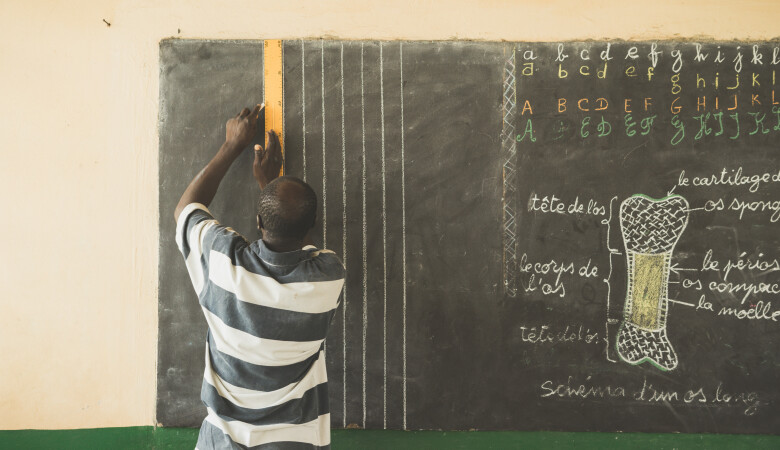Paul Prays for the Perfection of His Ministry Partners, Part 1 (Philippians Sermon 2 of 24)
September 14, 2003 | Andy Davis
Philippians 1:1-11
Joy, Prayer, Marks and Purposes
The Unfinished Castle
Last week we had the opportunity to look, in a big picture sort of way, at the book of Philippians. Afterwards Scott Markley said to me, “You know, you set out all the meals for us to sniff the aroma, but we didn't get a chance to eat any of them.” Well, now we get a chance to dig in and to try to understand this majestic letter of Paul to the Philippians. We're going to be looking, for two weeks, at Philippians 1:1-11. Especially next week, more at verses 9-11. But today we're going to take a look at Paul’s prayer life and his concern for the Philippians right from the very beginning of this epistle.
Now if you were to travel in the northern area of upstate New York, along the Thousand Islands area, you could visit probably one of the strangest mansions in America. It was a mansion built by a millionaire, a multi-millionaire named George Boldt, for he and his wife, Louise, to live in. 1899. He loved her very much and he wanted to give her this mansion and for them to move in on her birthday, which was Valentine’s Day. And so they built it on an island called Heart Island, and he used all the finest materials, the best craftsmen he could find. He even brought some over from Europe. He imported things, art works, tapestries, sculptures, all kinds of things, and they worked on it for four years, shaping it, preparing it for the day when the two of them would move in.
1904, in January, the work was almost complete. I mean, 95% done. There were crates of furniture waiting to be unpacked when suddenly a telegram came to stop all work because Louise had died. It was really a tragic thing, and he decided he would never set foot on that island again, and all work completely shut down and it’s remained that way ever since. And now you can tour it and look at it, but it’s been that way ever since, kind of frozen in time. It was a good work that was begun but never completed. It was a mansion that was started and never finished.
A Work in Progress
Isn't it a delight to know that that’s not going to happen to you if you are Christian? Isn't it a delight to know that, “he who began a good work in you will most certainly carry it on to completion, until the day of Christ Jesus?” And how fitting is this analogy, this picture, from this illustration of a mansion where a loving couple are going to live together? For Jesus said, “I go to prepare a place for you, and if I go and prepare a place for you, I will come back and take you to be with me. So that you will also may be where I am.” And so He’s going to prepare a place. One of the translations in John 14 says, “In my father’s house are many mansions.” There’s a sense of an ornate and majestic place to live. But what’s really fascinating is in Ephesians chapter two it says that, “you are being built together to be a dwelling in which God lives in you by His spirit.”
You are the mansion. You're the unfinished property. And not just you but all over the world brothers and sisters in Christ, being shaped and molded and worked on, we are works in progress. We're unfinished. And what a delight it is to know that He is the architect and the executor of the plan, and He will complete it on the day of Christ Jesus. Isn't that a delight? I mean there’s nothing else to rejoice in other than that this morning. We can just go home. Please sit back down. I don't want you to leave yet because there’s more things. But it’s a delight to know the sovereignty of God in salvation. And it gives us energy, and it gives us power to fight the good fight for Christ. And that’s what I get out of this text.
I. Background History of the Church at Philippi
Now, in order to understand the heart that Paul has for these people, you have to understand the background history of this church. Where did it come from? Now, the story is told in Acts 16 as Paul and Silas were out on the second missionary journey. They'd reached a certain place in Asia Minor where they could not make any more progress. The spirit of Christ would just not let them move, in any direction. They wanted to go east toward Asia but they just couldn't make any progress, and so they were just checked in the Spirit, and they were sensitive enough to the Spirit to just not move until they knew what to do.
And so one night Paul had a vision of a man from Macedonia saying, “Come over and help us.” Macedonia, now that was west. That was toward Europe. That was toward Rome. That the gospel should move westward, that was God’s plan at that point. The man of Macedonia, that is the origins of Alexander the Great. And from Macedonia, you know Philippi was named for Alexander’s father, Philip of Macedon. And from that little area came a world conqueror, Alexander, probably the greatest the world had ever seen at that point, maybe the greatest of all time, never lost a battle. And he rode eastward, coming down the same roads that the gospel is now coming back up westward, and there is this man of Macedonia. At one point the Macedonians ruled the world, and now he’s standing, this man from Macedonia, saying, “We need help. Come over and help us.” And they did need help because they stood at that moment under the wrath and curse of God, because of their sins. They needed a savior. They needed Christ.
A Glorious History
And so Paul and Silas went over to Philippi and they began to preach the gospel, and there weren't enough Jews, apparently, in Philippi to have a synagogue so there were just some women that used to meet down at the river. And Paul went down there, and one of them was Lydia, a dealer in purple cloth. And Paul brought her to faith in Christ by the preaching of the gospel. And she said, “If you consider us genuine believers in Christ, come and stay at our home.” And that became... I think Lydia’s home became the first church in Europe, really a house church. And what a delightful time Paul and Silas had there, and they continued to preach the gospel, and the progress was made. It wasn't long before there was some demonic opposition in the form of a slave girl who had a demon by which she predicted the future. And they followed Paul and Silas along saying, “These men are telling you how to be saved.”
Well, that was true, but they didn't want a demon proclaiming that. And finally Paul, so vexed in spirit, turned around and commanded the demon, “In the name of Jesus Christ, come out”, and the demon came out, and the girl was healed and brought to her right mind. Well, her owners, having no concern for her whatsoever, only for the money that they could make from her, were incensed and they got the authorities down on Paul and Silas. And they were beaten publicly, humiliated, brought to shame, and then thrown into the Philippian jail, and the jailer was commanded to guard them carefully. Now, if that were you, what attitude would you have that night? Here you're trying to be faithful, trying to preach the gospel, and this is what happens to you. But Paul and Silas, in probably one of their most glowing, shining moments, in the middle of the night, dark and in prison, their backs still bloody, put to public shame by their beating, are singing praise songs to Jesus Christ. Overflowing with gratitude and praise, they were just praising him. And all the other prisoners were listening to them.
And God moved. There was an earthquake and of a kind that I've never heard of since then, a special kind that open the doors of the jail and took their chains off. That kind of earthquake. Have you ever heard of an earthquake like that? A very surgical strike earthquake. That kind. So there they sat, but they didn't run anywhere. The Philippian jailer commanded to guard them carefully, his life on the line if they went out, thought that of course they'd escaped, the door was open. He draws his sword to commit suicide, his life, his soul, hanging in the balance at that moment.
Evidence of Love and Affection
Paul, out of compassion, calls out and says, “Don't harm yourself. We're all here.” And he calls for lights, runs in trembling, brings them out trembling, and says, “What must I do to be saved?” And that very night, the jailer and his family... they come to faith in Christ. They wash Paul’s and Silas’ wounds and feed them and they are baptized that very night. And so Paul has an incredible affection for this church, incredible memories of what God did, a delight, and he pours that out in prayer. And he knows that they aren't finished yet in their work. He knows that the fact that they've sent him money now through Epaphroditus is a good sign that they continue to track with the gospel, that they are partners, sharing with him and his ministry financially. And so he’s encouraged and he’s joyful, but he’s seeing now an answer to all his prayers. He’s so concerned about their spiritual development and he wants to let them know. And so he speaks to them and he writes this letter. From the very beginning, we see a sense of his compassion and his love for them.
II. Opening Greeting: Saints, Overseers and Deacons (verses 1-2)
Establishing Timothy
Verse one says, “Paul and Timothy, bond servants,[or servants,] of Christ Jesus.” It’s interesting to me how he includes Timothy right from the start here. The letter really isn’t from Timothy. I'm not in any way questioning inerrancy, I'm not saying that at all. But throughout the letter he says, “I”, and “me”, and “my”, more than in any other letter. This is a very personal letter from Paul. A total of 128 times in 104 verses, he says either I, me, or my. He uses these pronouns only 33 times in Ephesians, which is a much longer book. So this is a very intensely personal letter from Paul. He loves these people and he’s pouring out his heart. But he puts Timothy in the byline there because he wants them to accept Timothy as an authority figure, and he’s going to be sending Timothy back with Epaphroditus in his place. Paul can't leave, he’s in chains for Christ, so he’s going to send Timothy back. But this letter’s very much from Paul.
The Nature of a Servant
Paul calls himself and Timothy bond-servants, or servants, of Jesus Christ. This is a very, very important title that Paul frequently uses for himself, patterned after Christ’s own attitude, as he’s going to say in Chapter 2. “That Jesus, being in very nature God, did not consider equality with God something to be grasped but made himself nothing taking on the very nature of a servant.” This is the same word used of Jesus, a bond servant of God, the servant of the Lord from Isaiah, he is the servant, and he’s going to save. Paul says, “Your attitude should be the same, [or have this mind in you,] which was also in Christ.” Paul has it too. And so did Timothy. The attitude of a servant patterned after also the command of Christ, “Whoever wants to be great among you must be your servant. And whoever wants to be first must be your slave. Just as the son of man did not come to be served but to serve and to give his life as a ransom for many.”
Sainthood Explained
Well, who was the letter addressed to? Well, it’s addressed to the Saints in Christ Jesus at Philippi.
Now, I come from a Catholic background, and in the Catholic church, this means something different than it does to us. A saint is somebody who has been so designated by the Catholic Church, by the Pope. And there're certain steps... There’s a certain a procedure for becoming a saint in the Catholic Church. The process can only begin at least five years after the person’s death. A local bishop amasses data and information about their life and then an official Vatican theologian writes a biography and a history. And then a panel of eight theologians gets together and votes on whether you're venerable. That’s what the word means, that you could be able to be venerated as a saint. But even then, it’s not full beatification, blessedness of a saint. There has to be at least one medical and theologically verifiable miracle connected with your life, at least once. At least one, and then you can be a saint. And you know, in the middle ages, the veneration of saints reached worship-level. People would travel from all over Europe to just be near an artifact or a relic of a saint, and if you could touch one, perhaps you would be healed. And this was rife during the time of Luther and he spoke against it, cathedrals, and other things, this pilgrimage for relics and for saints.
This is not what the word means, not at all. The word means, “believer in Jesus Christ”. A true believer in Christ, that’s all. We are the saints in Christ Jesus. It’s used again and again in the New Testament of simple, humble, believers in Christ. You say, “Well, I never really thought of myself as a saint.” Well, the alternative is to not be a Christian, in the New Testament way of thinking. So, you are a saint. Act like it, that’s all. Act like a saint, because you are one if you're a believer in Christ.
Addressing Significant Leaders
Well, the letter isn't just addressed to the saints in Christ Jesus, but also to the overseers and deacons. These are two positions of authority, they are people that are called out. Deacons, it’s uncertain exactly what their role was, the word simply means servant, but that doesn't mean anything because Paul’s a bond servant and Jesus, also a servant. But clearly a significant role for these two. The overseers, “Episcopos,” from which we get Episcopalian, overseers. And always there’s a plurality of these folks in a local church. Some think they're pastors, others think that they are leaders called elders, a deep subject that we're not going to get into right now. But basically these are the forms of government, these leaders. And why he singles them out here, I don't really know, he doesn't do this in his other epistles, but he really does reach out here to the overseers and deacons. Perhaps that he’s going to commit this letter to them and that they would entrust it to the people, read it to them and teach it to them as well.
Conduits of Grace
Having given his greeting, he then says, “Grace and peace to you from God our father and the Lord Jesus Christ.” You know, you read that in just about everyone of Paul’s letters. And you could just read over it, “Well, there’s that grace and peace to you again.” But the fact of the matter is, you don't need grace just to begin the Christian life. You don't just need grace when you're saved by praying the sinner’s prayer and walking the aisle. You need grace every moment. You need a regular stream of flowing of grace to you at all times. You need grace to cover your sin, you need grace to fight off the devil, you need grace to understand the scripture, you need grace to get along with other Christians. It’s true. And they need grace to get along with you.
We need a flowing of God’s grace, and it’s constantly coming to us through conduits, through pipelines from heaven. And each one of us are called to be that for each other, a conduit of grace, and Paul meant to be that for the Philippians. He meant his letter to be a pipeline or a conduit of grace to sustain them and help them in their journey in Christ. Grace to you and peace from God our Father.
We are going to look at Paul’s prayer life in three steps:
- the character of Paul's prayer life (v.3-8)
- the content of Paul's prayer life (v. 9-11a)
- the goal of Paul's prayer life (v. 11b.)
III. The Character of Paul’s Prayer Life (verses 3-8)
Let’s look first at the character of Paul’s prayer life in verse 3 through 8.
1. Thankfulness
The first thing we notice, “I thank my God”, thankfulness- right from the start in his prayer life. Look at it in verse 3, “I thank my God every time I remember you”. And I believe that Paul’s commitment to a lifestyle of thanksgiving was the key to his rejoicing in the Lord always. An attitude of thankfulness, to thank God for everything that’s happening, realizing that all things work together for good, even being imprisoned after having been beaten, even that can work together for good, and sure it did. And so they were very thankful. Thankful people are delightful to be around, aren't they? Don't you just love being around thankful people? Conversely, isn't it a burden to be around people who are not thankful? It’s a trouble to us, isn't it? Well then, let’s be convicted ourselves. Are we thankful people? Do we exude gratitude to God, realizing that everything we get is better than what we truly deserve? If you believe that then you'll be thankful about anything you get because it’s all flowing to us from a good and loving Father who’s doing a great work in us.
Thankful people are humble people too, aren't they? They realize that they can't take credit for any of the good things that are going on in their lives. God gets the glory, he gets the credit, and so therefore, thankful people are very secure people, not easily moved or shaken because all things come from God. It’s fascinating to me, and I think it makes a significant theological point that Paul is consistently thanking God for the spiritual work going on in Christian’s lives. He’s thanking God for their salvation. That’s important to me. He does it again and again. He does it in Romans 1:8, he does it in 1 Corinthians 1:4, Colossians 1:3, 1 Thessalonians 1:2, again and again, thanking God for the salvation of these people. Very pointedly, he does it in Romans 6:17 when he says, “Thanks be to God that though you used to be slaves to sin, you whole-heartedly obeyed that form of teaching to which you were entrusted.” Remember how when I preached on that? I cleared it all out and said, “Thanks be to God that you obeyed.” You'll be the rest of your life figuring that one out. We usually take credit for our obedience, and our faith and our repentance, and they are our works, we're called to do it. But Paul gave ultimate glory and thanks to God for them, and that’s a solid foundation for prayer life, isn't it? Thankfulness to God.
2. Remembrance
Secondly, remembrance. He says, “every time I remember you”, “in all my remembrance of you”. Paul was constantly remembering the Philippians. This shows I think a very important point that he is not a self-centered individual. What happens to you when you go through sufferings? Who do you start to think about the most? Isn't it you? Isn't this what we do? When we go through sufferings, we turn inward and begin to focus on ourselves. But Jesus did not do this. Up on the cross, he’s saying, “Father, forgive them. They don't know what they're doing.” And John and Mary, they're at the foot of the cross and he says, “Behold your son”, and “Here is your mother”, and then John takes care of Mary. And then to the thief on the cross he says, “Today you will be with me in paradise.” Three of Jesus’ seven statements are others-centered, while he’s dying on the cross under the wrath of God for our sin, he’s others-centered.
Paul was a dim reflection of that here. He’s in prison, suffering for the gospel, and he’s thinking about them. He’s others-centered, and he’s remembering them, and every time he thinks about them he just can't stop thanking God. For that vision of the man of Macedonia, for the trip over there, for the first that he met Lydia by the river and how she was so open to the gospel, and how she opened her home and the times they had in that little house church. And then, he’s remembering God’s power in driving that demon out of that slave girl. And then how much more that night in the prison, probably, he might say, the best night of his life, when God moved in such a mighty way and the Philippian jailer was saved. What a sweet remembrance. And every time he thinks about them, prayer just goes up and he thanks God, every time he remembers them. Memories should lead us to prayer and to thanksgiving.
3. Consistency
Thirdly, we see consistency, or you could say constancy. Look at v.3 and 4, “I thank my God every time, I remember you. In all my prayers, for all of you, I always pray with joy.” There’s a kind of a piling up of the always here. He’s a regular, faithful prayer warrior. Now, wouldn't you say if you were challenged and felt comfortable to be open and honest, that this is the hardest part of prayer for you? To keep praying even when it seems that nothing’s happening? To be faithful and to continue praying, even though it seems that very little is coming back on the invested time. For me it is. I'm sharing very openly with you. It’s hard for me to imitate Paul in this but I want to. And I want to grow, and I want to be constant and consistent. Like George Mueller for example, that prayed for over 50 years for the salvation of a family member. For 50 years, never gave up, just kept praying, kept praying, kept trusting. And in the end, after he was dead, the prayer was answered.
God’s so faithful. And you know it’s interesting, what Mueller said about this constancy in prayer. He said “Satan will not mind how we labor in prayer for a few days, weeks, or even months, if he can at last discourage us so that we cease praying as if it were of no use.” He'll tolerate your prayers for a few days or a few weeks or months but in the end he wants you to stop praying. And he will labor to convince you that prayer is of no use.
But the bigger mystery comes from God’s side. Why does he make us wait so long? Why not answer our prayers, especially if they are very much in line with his will? This is a great mystery, isn't it? Andrew Murray talks about this mystery. He says, “Of all the mysteries of the prayer world, the need of persevering prayer is one of the greatest. That the Lord, who is so loving and longing to bless should have to be asked time after time, sometimes year after year before the answer comes, we cannot easily understand. It is also one of the greatest practical difficulties in the exercise of believing prayer when after persevering, pleading, our prayer remains unanswered, it is often easiest for our lazy flesh and it has all the appearance of pious submission to think that we must now cease praying because God may have his secret reason for withholding his answer to our request. It is by faith alone that this difficulty is overcome.”
It’s a mystery, isn't it? Why does God make us wait so long? The psalmists wrestle with this, don't they? “Why are you so silent, God?” But he wants us to grow in prayer. And so, Paul gives us an example here of consistency or constancy in prayer.
4. Joyful
Fourth, we also see joy. “In all my prayers for all of you, I always pray with joy.” This may be a second big challenge to you in your prayer life. Do you really enjoy your prayer life? Do you pray with joy? Are these sacrifices a delight or a burden like it says in Malachi, “What a burden! And you sniff at it.” “Everyday we’ve got to take up this prayer list.” It can be that way, and we need to recognize that that’s not in God’s will for us. He wants us to pray with joy, a sense of confidence that our prayers are actually part of God’s sovereign plan for the working out of his purposes in the world. That our prayers are triumphant, that good things are coming as a result of prayer.
Prayer was, I think, Paul’s language of joy. Whenever he felt joy, he wanted to pray, and whenever he lacked joy he prayed the more. He always prayed with joy, and why? Because of what God was doing in the lives of the Philippians.
5. Reasoning
That looks at my fifth reason here, there are reasons in his prayer. It’s a reasoning prayer life, a reasonable prayer life. He gives two of the reasons here, “because of your partnership in the gospel”, a very important word, and we will talk about it in a moment. “your partnership in the gospel, from the first day until now, being confident of this, that he who began a good work in you will carry it on to completion until the day of Christ Jesus.” But what I'm getting at here is that he has reasons for joy, and reasons for prayer.
You know, it’s actually easy to be joyful if you don't really know what’s going on. That’s called ignorant joy. In one sense it’s a good thing that children can play in concentration camps and they don't really know what’s going on in their lives. They can do that, and I'm glad that they're free from the burdens of knowing how severe the circumstances are. But that’s not the kind of joy that Paul has here. He’s looked at everything square in the face: all the obstacles, his imprisonment, the enemies of the Gospel, the Judaizers. He’s looked at all of the opponents, and he prays with joy because he knows that God is more powerful than all of those things. There’s a reason behind his joy and behind his prayer, it’s a reasonable prayer life. Now, let’s look at those two reasons.
6. Fellowship
Sixth, fellowship. He has a reason for joyful prayer because of this concept of fellowship, or partnership. In v.5, “because of your partnership in the gospel, from the first day until now” And then again, you see it in v.7, “for whether I am in chains or defending and confirming the gospel, all of you share, you are partakers with me in God’s grace.” Paul prays for them out of this concept of partnership, out of this idea of fellowship.
The word is Koinonia. You've probably heard it before. And it’s a very significant word. Ancient Greek society had a sense, both of the individual and their rights and privileges, and of the collective community and society. There were some things belonging to the individual and some things that were held in common. Even land would be held in common, and those common things were called koinos, from which we get Koinonia. The Greek language that those of you who are in Seminary are studying is called Koine Greek, it means “the common tongue” that everyone spoke. It was what was shared together. And we have the same concept up in New England, there are areas called the common. Boston Common, in Lexington, that’s where the first shots were fired in the revolution in the common area. It’s the idea of something that everyone kind of shares and holds together, something in common. And Paul talks about this in Philippians 2:1, he says, “If you have any encouragement from being united with Christ, if any comfort from his love, if any fellowship... [That’s the same word, “Koinonia”] fellowship with the Spirit, if any tenderness and compassion, then make my joy complete by being like-minded, having the same love, being one in spirit and purpose.”
Unity with Christ is unity with his people
So what he’s saying, and in Paul’s way of thinking, when you come to faith in Christ you become united with Christ, and share things with him. You share things together. You share his suffering and you share his glory. You share his way of thinking and you share the outcome of that way of thinking. You share his plans and his work and all of the fruits that come from that at the end. You're partakers, or sharers together with Christ. You're part of his body, sharing things together. Saul of Tarsus got a lesson about that, didn't he? Remember the persecutor of the church on the road to Damascus? And the risen Lord, glorious, knocks him to the ground and says, “Saul, Saul, why do you persecute me?” In essence he was saying, “These people are in fellowship with me, they're a part of my body. You're attacking me.”
So he had an intense sense of sharing with Christ, and he loved it. It became the whole purpose of his life as we'll see in chapter three where he says, “I want to know Christ and the power of his resurrection and the fellowship, [the Koinonia, the fellowship] of sharing in his sufferings, becoming like him in his death and so somehow to obtain to the resurrection from the dead.” There’s a sharing together with Christ. And this got very practically reflected in the New Testament when, after they came to faith in Christ, they became sharers of all things together. Nobody considered that any of his possessions was his own, but they shared everything they had. And so he’s talking about partnership and that they shared their money. The Philippians shared their material possessions with Paul so that he could eat and continue in his ministry. They became tangible supporters of his by sending money; they had partnership in the gospel.
The ultimate goal of this fellowship is that we “participate in the divine nature,” isn't that wonderful? 2 Peter 1:4. The goal is that we be sharers together with God. You read in 1 John1:3, our fellowship is with God and with one another through Jesus Christ. It’s a delightful thing. And so Paul thinks of his prayer life as an outworking of this fellowship. He’s sharing together in what God is doing in their lives by praying for them. And they are sharing together in what Paul is doing by sending money. There’s a sharing together, a Koinonia.
7. Confidence
Seventh, we see also confidence. “Being confident of this”, v.6, “That he who began a good work in you will carry it on to completion until the day of Christ Jesus.” I could have preached the whole sermon just on this one verse, but I want to see it in this context of Paul’s prayer life. Paul’s prayer life is fueled by a confidence in the sovereignty of God in salvation. Isn't that wonderful? We are confident that God is sovereign over salvation. As a matter of fact, if God is not sovereign in the matter you're praying about, why pray to him about it? Why bring it to God if he can't do anything about it? But he can. And so we bring to him the salvation of our loved ones, of our children, of our parents, of our friends, co-workers. We bring it to him again and again, and we should. We pray that God’s work would be done in their lives because we consider God sovereign in that matter. But we don't just stop when they have come to faith in Christ, no, then we really roll up our sleeves and say, “Oh Lord, perfect them now. Bring them on to completion to the day of Christ Jesus. Keep working out your plan in their lives all the more.”
Hebrews 12:2 says that Christ is the one we should “fix our eyes on, [he who is] “the author and the perfecter of our faith.” He wrote your faith’s first word and he will write its final chapter, too. And he’s not going to put his pen down till the story’s finished. Isn't that delightful? He is the author of your faith and he will finish that story. He’s powerful enough to do it. Do you realize that it is he who began the good work in you; you didn't begin it in yourself? Yes, you must “…work out your salvation with fear and trembling, [but] it is God who works that in you, to will and to act according to his good purpose.”(2:13)
Concerning fruit or money?
And so he is praying with confidence in God’s sovereignty in all areas. Some commentators that I've studied say that really, there’s a localized focus here, just on the money gift and in effect he’s saying, “He who moved you to give me some money will move you to keep giving me more money.” Do you really think that’s what Paul’s saying here? I don't think so because in chapter four he says, “Not that I'm looking for a gift but I'm looking for what may be credited into your account.” (v.17) He is saying, “I have everything I need but I'm delighted for your sake that you are sharing this money because it shows you're not idolatress and money grubbing and so concerned about the things of the world. You're releasing it to God and it shows that God’s doing good work in your lives.”
So he’s not concerned about that, and even more, the text says, “He who began a good work in you will carry it on to completion until-” when? “the day of Christ Jesus.” Paul’s not going to need money that long. His need for money is long gone. You don't need to send money to Paul. He’s finished now with that. He doesn't need it anymore.
But are the Philippians done being saved? No, they're not. And you know how I know? They don't have their resurrection bodies yet. They're not glorified yet. They're waiting in heaven, waiting for us and we'll be waiting for the next generation if the Lord tarries. We'll be waiting until we can all be resurrected into Christ’s glorious body. We will talk about that in Philippians 3.And so he’s going to keep working in you until the day of Christ Jesus, finishing that salvation work. And that confidence just moves Paul to pray.
Some people say a strong confidence in sovereignty moves you to do nothing. I think quite the opposite. It moves me to get on the winning team, to jump on the bandwagon, to say, “This is a winning team. We're going to succeed.” And so, to pray for what God is doing in their lives and to keep praying.
8. Affection
And then finally, we see affection in v. 7 and 8. “It is right for me to feel this way about all of you since I have you in my heart. For whether I am in chains defending and confirming the gospel, all of you share in God’s grace with me. God can testify how I long for all of you with the affection of Christ Jesus.” There’s such a tenderness here, isn't there?
We're going to see throughout the letter Paul is a very encouraging man to these people. He says in 2:12 “…as you have always obeyed, even in my absence…” continue to obey. He’s very encouraging to them because he loves them. And his prayer life is really an outworking of his love for them. I really believe that prayer is a barometer of love. The more you love, the more you're going to pray. And so we need to increase our love, so that our love may abound more and more. We need that. We'll get to that, God-willing, next week.
Next week we're going to see the content of Paul’s prayer life in verses 9 through 11a, and then ultimately the goal of Paul’s prayer life, the glory and praise of God. We'll see that next time.
V. Application
Let’s say a word about application.
First of all, I want you to have absolute confidence in God’s sovereignty in your own salvation. Don't look to yourself to save yourself. Don't look to yourself to run the Christian life. Realize that he who began a good work in you will not stop until it’s finished. And so be confident and that confidence will give you energy to fight the devil, energy to say no to besetting sins, energy to pray, energy to evangelize, confidence that God is going to win and to work out all of his purposes. It gives you great drive for internal perfection, not that we ever attain that in this world, but growth and holiness, and external world evangelization.
Secondly, pray like Paul. Pray like Paul. Take the list of these characteristics and look over and say, “Do I pray like this? Am I a consistent prayer warrior? Do I pray with thankfulness and with joy?” And if not, ask God to work it in you. Imitate Paul in his prayer life.
And thirdly, I'm going to actually talk about money. I don't do that very often and I always say, “I only do it if it’s in the text.” Well, it’s in the text, and I couldn't escape it this time. The partnership was financial; they shared together (4:14-19). I want you, under the leadership of the Spirit, to analyze your giving. I want you to look at how you're giving financially. Not just to this church, but to God’s work around the world. Who are you sharing together with? Who are you partners with in the work of the ministry? And are you giving sacrificially?
We're at present more than $50,000 behind our budget. People say, “We're frequently behind.” And that’s true, but is that the way it should be? I think we should be more faithful and more consistent in our giving. It’s a discipline every week to set aside, on the first day of the week, the ties and offerings for the Lord. I think we need to be faithful in this. We need to see that number shrink from $50,000 plus, down. But not just the giving to this church, but to all of God’s work around the world. There are other people that are doing work around the world, serving him faithfully. Let’s be partners and sharers together with them in their ministry.
























